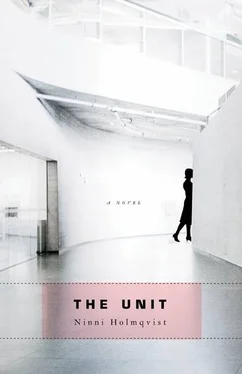The stillness had been disturbed, as if someone had drilled right through it and smashed it to pieces. All of a sudden I felt cold, frozen.
The breakfast buffet in the Terrace restaurant was groaning with fruit and vegetables, freshly baked white and brown bread, cheeses, pâtés, salami, ham, eggs, oatmeal, yogurt, cereals, jellies and marmalade, and on a table nearby was coffee and hot water on hotplates, and milk and juice in thermoses to keep them cool.
Elsa just took a cup of coffee and a bowl of yogurt with granola and sliced fruit, while I piled up my tray with as much as it would hold: coffee, freshly squeezed orange juice, cinnamon toast, yogurt with raspberry jelly and cornflakes, a boiled egg, three sandwiches-one with Emmental cheese, one with honey-smoked ham and one with ginger marmalade. I didn’t expect to be able to eat it all, but it smelled so good, looked so attractive, and as it didn’t cost anything I saw no reason to stop myself or hold back.
We moved through fifteen or so other diners to a table where we could look straight down onto a circular patio with marble benches and a fountain, surrounded by low palm trees and hibiscus bushes with bright red flowers. The winter garden extended around and beyond the patio. The morning sun was shining in at an angle from above. I could see birds, butterflies, bumblebees. Far away I could just glimpse a weeping willow, a wisteria, a big copper beech and Monet’s lily pond. Elsa gazed at all the greenery, and in a tone of voice that I interpreted as tired, but later would realize was more likely to be apathetic, or possibly ironic, she said:
“Isn’t that lovely.”
“Yes,” I said.
I was feeling pretty good, almost confident after the walk and the time spent with Majken the night before, and I had slept surprisingly well without needing to take a sleeping pill, and even if I hadn’t managed many hours of sleep before Elsa rang just after eight, I felt rested. I took a cautious sip of my coffee, which was steaming hot, black, and smelled fantastic. Closed my eyes, swallowed.
“Oh, that’s good!” I exclaimed spontaneously, and went on:
“This is such a treat, isn’t it? Being able to go out for breakfast.”
“Out?” said Elsa, raising an eyebrow and looking around and up toward the dome, which in daylight turned out to consist of several large sheets of glass, set in lead-at least I presumed it was lead-and put together in a symmetrical, starlike pattern. There was something British or colonial about it, like the roof of an orangery in the gardens of a palace. The sky on the other side was clear blue. Individual clouds sailed majestically by, and the word “galleon” came to mind.
“I don’t mean ‘out’ as in ‘outside,’” I explained, “but more as in the opposite of being at home. Going out, sort of.”
Elsa mumbled something inaudible. Not a morning person, I thought. She’s got out of bed on the wrong side.
“I’ve never been out for breakfast before,” I went on, taking a bite of my cheese sandwich. Chewed. Swallowed.
“Have you?” I asked Elsa, who-I now noticed-wasn’t eating or drinking, just poking her spoon listlessly around in her yogurt with granola and sliced strawberries and mango.
“No,” she replied in a flat voice. “Not as far as I can remember.”
It was now I realized she wasn’t tired, or at least that wasn’t the main problem. This wasn’t about being in a bad mood because it was morning, she just felt bad all over. I was ashamed. I put my sandwich down and said:
“Elsa, I’m sorry!”
“For what? Because you can manage to be positive? There’s nothing wrong with that.”
“No, because I’m so caught up with myself I didn’t realize that you…”
I broke off-I had absolutely no idea what words to use, so instead of finishing the sentence I reached across the table with my right hand and clasped Elsa’s left hand, which was lying limply beside her bowl. Her right hand was still clutching the spoon in the yogurt, but it wasn’t moving now. She closed her eyes. She screwed them tight shut. She bent her face over the bowl so that I couldn’t see it, only her bangs, like a brown-and-silver-striped curtain. The hand I was holding was cold, and was shaking slightly.
“It’s okay…” I said, tentatively at first, trying to sound as calm, as secure as Majken, Alice and Johannes had the previous evening. “There now, Elsa, it’s okay. There now.”
She was weeping now, silently but with drawn out, suppressed whimpers and quivering, hacking breaths as I squeezed her hand and repeated “It’s okay,” because I didn’t know what else to say or do.
The other people up on the Terrace this Sunday morning-the others who were having breakfast at tables around us, reading the morning papers or chatting quietly with one another, or simply eating in silence without reading, and the two breakfast hostesses who could have been either employees or residents, bringing in one pot of coffee after another, topping up the dishes on the buffet, wiping down tables, carrying out dirty dishes and providing clean plates and cutlery-started noticing Elsa. One or two put down their newspapers and took off their reading glasses, others put down their coffee cup, placed their spoon in their bowl of oatmeal, or pushed their tray away from themselves, slightly across the table. Conversations fell silent, one by one. One hostess stopped in the middle of the room carrying a dish of sliced papaya. Everybody was staring at us, and everyone looked serious. But no one seemed troubled, no one seemed upset. They were just paying careful attention. They were waiting, I realized just a little while later. They were waiting to see how things unfolded. And when Elsa was finally unable to control the sobs she had suppressed until now, when her cries became louder and more piercing and persistent, first one of the diners got up, then another, and a few more, and the hostess hurried over to the buffet table and put down the dish so that her hands were free. The next moment a crowd of people surrounded Elsa in a semicircle, some sitting on chairs they had dragged along with them, others standing. Those who could reach were touching her. With steady hands they held her shoulders, or stroked her arms, her back or the nape of her neck. As if they were holding her together.
The small shops and workshops in the galleria were open now. People were standing or sitting inside, working on different activities related to plants, herbs and spices. The whole galleria was flooded with sunshine, revealing that the air in here was filled with very fine particles, forming a gossamer-fine, yellowish mist. There was an aroma of spices and flowers.
It was warm in the winter garden, perhaps as high as eighty degrees, at least in the sun. Elsa and I strolled along in silence. Birds sang. Flies and bees buzzed. A squirrel leaped among the branches of a stone pine, stopping from time to time to grab small orange cones with his teeth; he would hold them between his front paws and eat quickly, then shoot off, leaping with ease and assurance to the next branch. We carried on through the olive grove, passed an area planted with rosebushes, and entered the citrus grove, where the trees were covered in white blossoms that filled the air with a sweet, fruity perfume, and came out again on the other side where the vegetation was dense and tangled. After an avenue of tall bushes and low-growing trees we reached the huge lawn, where people were lying and reading, or simply relaxing in the sun. We walked around the edge of the lawn and on past springs and small fountains and underneath trellises covered in vines, roses, sweet peas, honeysuckle, clematis and bougainvillea, through narrow overgrown passageways and thickets, and eventually reached Monet’s garden. There, in front of a large bed of forget-me-nots and pink and red tulips, Elsa stopped dead. We were on the exact spot where the pink house would have stood if it had been the original garden. On the far side of the forget-me-not bed and two yew trees lay the flower garden, with its rows of flowerbeds and gravel paths in between. Elsa looked around in confusion, then exclaimed:
Читать дальше












